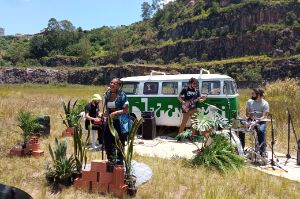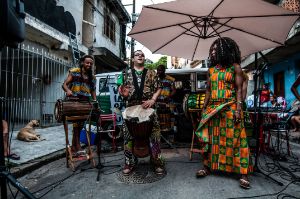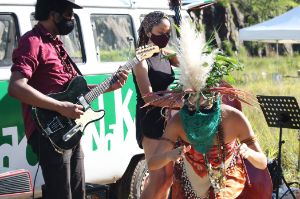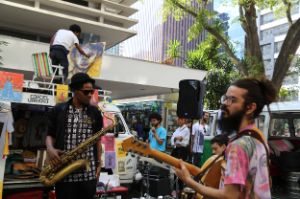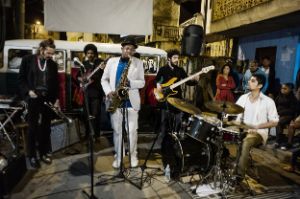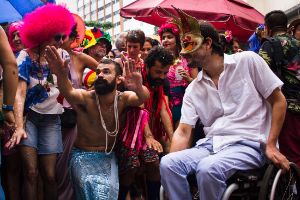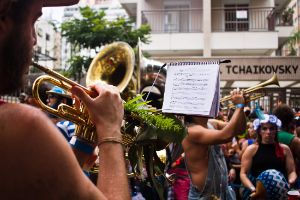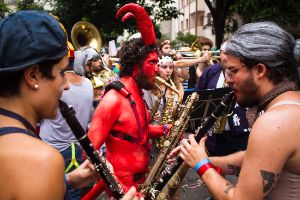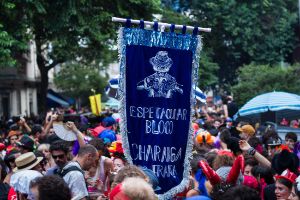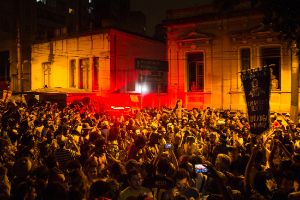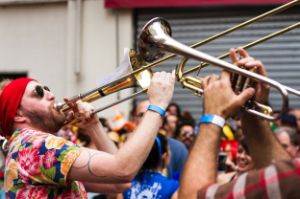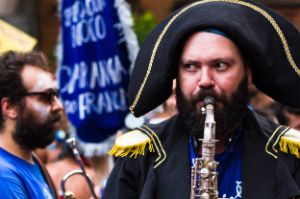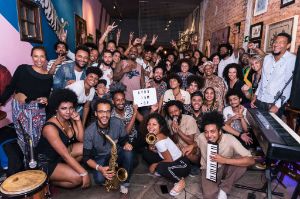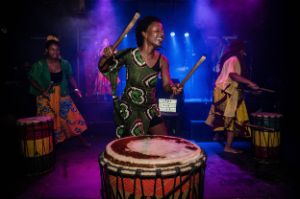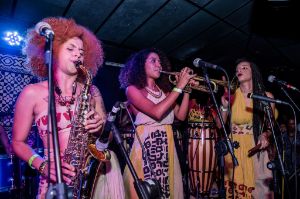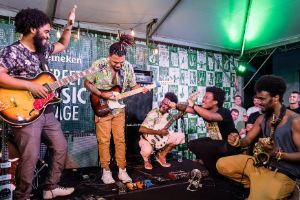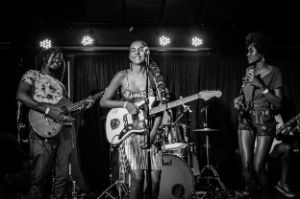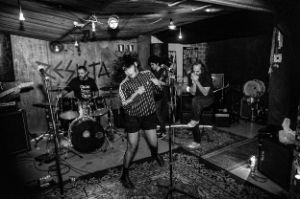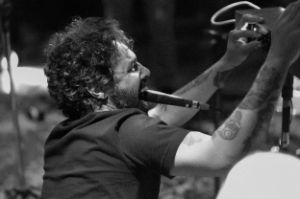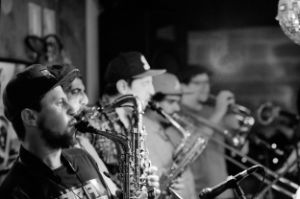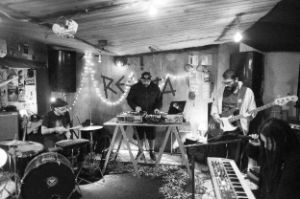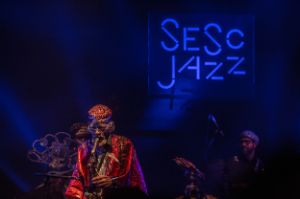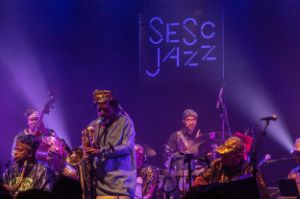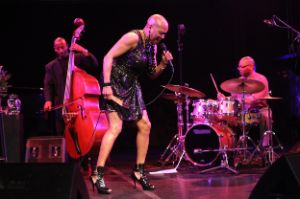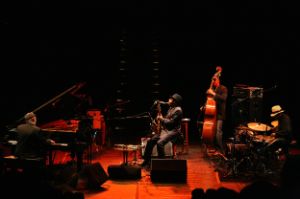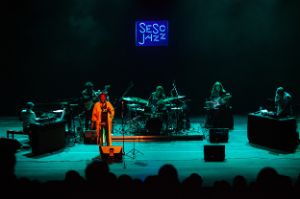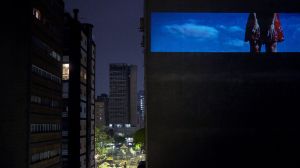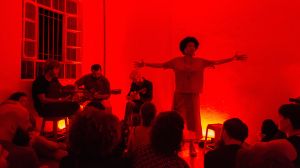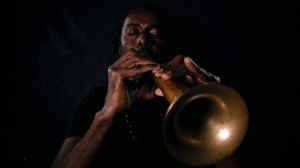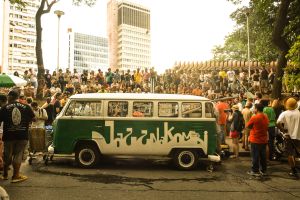
Jazz na Kombi – Praça Roosevelt
© Cassimano
Inside the Scene: São Paulo
1
TheEarsoftheMetropolis
Peripheries and Public Spaces
The last decade has been an especially fruitful one for jazz and improvised music in São Paulo. The scene has been invigorated by projects that occupy public spaces and institutions that are willing to host the creation and performance of free music, as well as groups with the most diverse styles creating their own sounds, causing fissures in the hard concrete of social inequality by stimulating the ears of the metropolis. The traditional venues focused on the genre are still there, but it is in the movement that goes from the centre of the city to the periphery – and vice versa – that we see bold ideas of curatorship emerging.
Jazz na Kombi
A customised Volkswagen camper van parks in different places in the city of São Paulo and opens its doors to become a sound system that disseminates the musical research of its directors, creating space for concerts by jazz groups and other street artists. Jazz Na Kombi was born in February 2014 and has since organised independent jazz festivals with musicians from different generations, fulfilling a mission to put jazz on the road and make it more popular.
Jazz na Kombi
2
ManyBrazils
São Paulo as a Cultural Hub
Like all of Brazil, São Paulo is a city of contrasts. Musically speaking, however, it is possible to distinguish it from other Brazilian regions in terms of its relationship with local and foreign culture. With a population of over 12 million people, São Paulo gathers together several countries, and, we could also say, many Brazils. The most striking features of its music come from outside – whether from immigration or other parts of the country – unlike cities like Rio de Janeiro, Salvador or Recife, where there are strong local traditions. Perhaps this is the main reason why the city is such a favourable territory for experimentation, as its musical identity is constantly being (re)created by culturally diverse artists.
A espetacular Charanga do França
Charanga do França is a carnival procession that drags thousands of people through the streets of the Santa Cecília neighbourhood of downtown São Paulo, playing well-known carnival songs, melodies influenced by African tradition and classical sambas, all in instrumental arrangements. It is led by the saxophonist Thiago França, who started his career playing jazz and choro.
A espetacular Charanga do França
The way these global influences connect and blend with regional styles and traditions is different each time, producing such disparate musical results as the driving, stylistically eclectic arrangements of Méta Méta and the free jazz-fuelled collages of Radio Diaspora, a duo formed by the drummer Wagner Ramos and the trumpeter Rômulo Alexis. When listening to the more than 10 albums released by the latter, we hear sound phrases that start as fast as accurate shots travelling along colourful lines and waves. Its themes are guided by references to the sounds of the African diaspora, as its name suggests, including deconstructing (or highlighting) elements that form the main rhythms of Brazilian music, such as samba and Black popular music. Radio Diaspora also features references well-known to the Black community by including samples of speeches or striking voices, such as those of Martin Luther King jr. and Muhammad Ali.
Radio Diaspora in portrait
© Pérola Mathias, Bruno Rico, Diego Arvate
AFROJAM-SP
AFROJAM-SP is a musical project whose premise is the musical celebration and promotion of the prominence of independent black artists. At each edition, new artists are invited to introduce themselves and join one big session, transforming the meeting into an exchange of knowledge and experiences, seeking to build more egalitarian relationships and spaces.
AFROJAM-SP
3
BeyondGenres
Popular Culture Meets Avant-Garde
In the intersection between genres and languages, São Paulo’s urban scene has also served as a breeding ground for unruly musical movements such as the so-called Vanguarda Paulista, fraying the limits of the song format, so familiar to Brazilian culture, since the 1980s. Artists such as Arrigo Barnabé, Itamar Assumpção, and the sisters Tetê and Alzira Espíndola have explored the creative possibilities of the genre, incorporating influences as diverse as serialism and comic books among traditions of African origin such as “batuque de umbigada”.
Years before, in different ways, other artists had similar experiences, such as Walter Franco, who incorporated concrete poetry, and Tom Zé, an artist from Bahia who lives in São Paulo and who was one of the precursors of the Tropcália movement. They opened paths for names from newer generations, with whom some of them actually maintain artistic partnerships, as is the case with Arrigo Barnabê and the musicians of Quartabê, most of which once were members of his large ensemble.
74 CLUB
On the edges of the immense São Paulo, there is a region known as ABC Paulista, that is made up of seven cities. One of these is Santo André, where several influential musicians in the current regional and national scene came from. One of the places where you can find these musicians is the 74 Club, which hosts everything from experimental jazz to punk and hardcore bands.
74 Club
Another contemporary representative of this (anti-)tradition is Negro Leo. With a vast musical oeuvre, his compositions move fluidly through different genres, bringing to the surface the intense combination of lyrics and melody that characterises the craft of Brazilian popular song, while becoming tangled in threads of rhythmic deconstruction, travelling through sound textures and playing with improvisations. His sounds and lyrics are at times provocative, at times amusing. With a keen sense of understanding and criticism of the reality around him, expressed in a crude and sometimes mocking way, he is able to broadly address society’s structural deficits while also targeting specific issues, in a kind of sociological zoom out and anthropological zoom in.
Negro Leo im Porträt
© Pérola Mathias, Clara Lobo
4
EmbracingtheMusicalHeritage
Re-Inventing Tradition – Experimentalism & Improvisation
The laboratory-like character of São Paulo’s creative music scene also becomes manifest in the growing interest in improvisation, especially free improvisation, that has been gaining ground over the last decade with new artists, organisers, producers, labels, websites and multidisciplinary alternative spaces – and with large festivals such as Sesc Jazz and Nublu Jazz Festival alongside independent initiatives happening around the city.
Sesc Jazz Festival
Again, what makes the local scene unique is how the free improvisation movement is rooted in a broad range of styles and musical contexts and, rather than turning a blind eye to tradition in an elitist gesture of emancipation, how it embraces the musical heritage of both the city and the rural regions that surround it. Musicians such as Juçara Marçal and Thiago França from Metá Metá and Mauricio Takara from São Paulo Underground appear in a variety of musical projects within the scene, representing both traditional aspects of urban musical culture and regional styles as well as highly experimental settings and free improvisation.
Leviatã
Leviatã is a publisher and cultural centre sited in downtown São Paulo. It opened in March 2018, when it first began developing its own events and editorial projects in collaboration with contemporary artists from Brazil and other countries around sound, visual, body and textual art, unfolding in video performances, audiovisual albums, films, videoclips, music albums, documentaries and articles, available through the publisher’s digital platforms.
Leviatã
This special relationship between experimentation and tradition has been documented in a yet-to-be released film project by Luan Cardoso, focusing on the ongoing collaboration between experimental violinist Thomas Rohrer and folklorist Nelson da Rabeca, a local legend in building and playing traditional fiddles, along with other musicians in the project Tradição Improvisada. The director has agreed to provide an exclusive preview of the film for Jazzfest Berlin.
Tradição Improvisada in portrait
© Luan Cardoso
Cadós Sanchez in portrait
© Pérola Mathias, Cadós Sanchez
Contributors
Juliano Gentile
Juliano Gentile is a musician and curator. He is a guitarist and a composer with the band Berberes. He is also part of the duo César & Juliano, where he has worked on interdisciplinary projects. As a curator, Juliano has worked with institutions such as the Centro Cultural São Paulo, one of the largest cultural centres in Latin America, where he has co-ordinated a series of concerts and workshops about improvisation. He is currently one of the music curators at both the CHIII – Creative Music Festival and the Instituto Moreira Salles (IMS).
Pérola Mathias
Pérola Mathias holds a PhD in Sociology, researching contemporary Brazilian music, and works as an independent music journalist. In 2015, she created a blog named Poro Aberto, which later became a programme on antenAZero online radio, and for which she curated shows between 2019 and early 2020. Pérola has a monthly column in A Palavra Solta magazine and publishes weekly on @resenhasmiudas, an Instagram magazine. She also writes and presents a podcast for São Paulo Municipal Department of Culture.
Manoela Wright
Cultural agent, curator, researcher and artistic manager Manoela Wright is the Artistic Director and curator of CHIII – Creative Music Festival. She founded Uirapuru Produtora in 2012 in São Paulo, Brazil. Uirapuru Produtora works in artistic management, booking shows in Brazil and abroad, and the conception and realisation of projects focused on experimental music. She has toured Brazilian artists to Latin America, Europe and Asia as well as presenting European, North American and Latin artists in Brazil.
